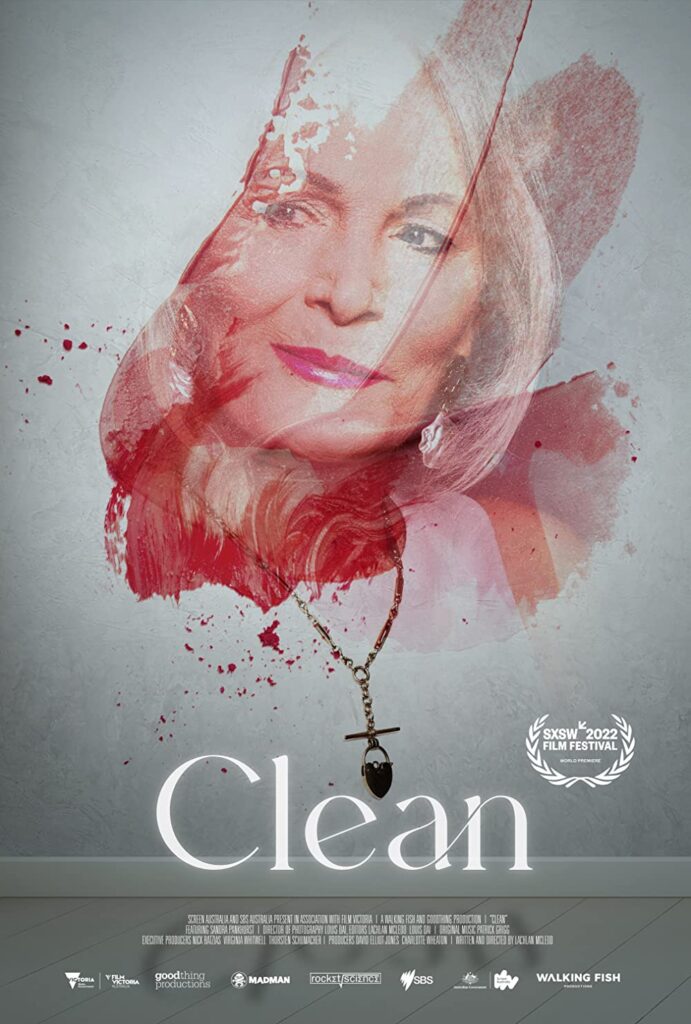An interviewer asks Sandra Pankhurst, the subject of Lachlan McLeod’s documentary Clean what she would like to be remembered for. Sandra answers “Being kind, nothing more, nothing less.” After the publication of the ‘The Trauma Cleaner’ the bestselling biography of Pankhurst by Sarah Krasnostein, Sandra will be remembered for much more, but as McLeod’s documentary proves radical empathy ran through her heart and touched many lives with her fierce determination to overcome her own trauma by helping others during theirs.
Sandra Pankhurst lived many lives. She was forcibly given up by her birth mother and adopted into a family that abused her mentally and physically. Forcibly evicted from that family at the age of seventeen Pankhurst married and began her own family (which produced two sons) only for that to fail as she realised she was queer. In the 70s she began taking female hormones and eventually got gender confirmation surgery; however the journey was fraught with pain as she moved from burlesque dancing to sex work in St Kilda and Kalgoorlie. A violent rape ended her life as a sex worker, a fact that the documentary casually drops in. By her thirties Pankhurst had been a parent, a sex worker, a drug addict, divorced, and forced to the fringes of society. It is a testament to her fundamental strength that she not only managed to survive a deeply abusive childhood and tumultuous early adulthood; she turned her pain into a business that cleaned up the worst pain of others.

After stints as a taxi dispatcher and running the first woman owned funeral service in Australia, Sandra started the business that would become Specialist Trauma Cleaning. The focus of the business was to clean crime scenes, deal with hoarding, clean deceased estates, provide cleaning services for people with mental and physical disabilities, and generally protect vulnerable people when they most needed it. Pankhurst and her team were never judgemental. In one instance we see STC cleaning out the public housing home of a man whose mental health is compromised. The team has to dig syringes out of the walls and floors. No one defines the client as a hopeless junkie. Instead many of the team ruminate on how easy it is to slip through the cracks and fall into trauma.
Although Clean is primarily focused on Pankhurst it allows time for her workers and clients to express themselves. McLeod isn’t interested in shocking the audience, although there are certainly uncomfortable scenes, he is concerned with showing how kindness can shine through the seemingly darkest spaces.
Sandra began her business on her own in a van. She wasn’t aware of the need to wear PPE and as a result ended up with a life-long pulmonary condition. McLeod shows her in hospital gasping for air, but Pankhurst refuses to be seen as a victim. She’s honest to a fault about what scares her, which isn’t death but the matter of how one dies. Later in the documentary as her health is failing rapidly she admits that she wants to live despite being in the shadow of death for so long. Pankhurst is frank but at times contradictory. She searches out her birth mother despite claiming that she has no interest in family. It isn’t until the coda of the documentary that we learn she reconnected with one of her sons. What is clear is that Sandra built her own family with STC. She is a matriarch who cares for her employees and realises the stresses they are under doing the kind of work “No one else wants to do.”
After the publication of Krasnostein’s 2017 book on Pankhurst, Sandra turned her talents to motivational speaking. She was no stranger to the media but became a small-time celebrity with her extraordinary story. McLeod filmed Clean over a three-year period and captured Sandra’s failing health and eventually her death. For a woman who held little back, Sandra also valued privacy. There are topics that she would not expand up in the documentary and things she refused to have named or filmed. The heart of McLeod’s work is encompassing Sandra’s own vast heart. More than a survivor, Sandra was a woman who knew the value of compassion. She knew trauma could happen to anyone at any time in their lives and considered it a privilege to be able to assist those who became lost or fractured. In her life she saw the worst of humanity but rallied to present the best of humanity to the world.
The only stumbling block in McLeod’s vision is the recreations of certain events and crime scenes. It is enough to rely on the people telling Sandra’s story and the story of STC without adding a layer of fiction to it. Despite this small gripe, McLeod has created a striking documentary that shows Sandra Pankhurst’s immense grace and resilience and singles her out as a woman who took darkness and turned it to light. May we all find inspiration in her.
Director: Lachlan McLeod
Featuring: Sandra Pankhurst



